By Mackie M. Jalloh
In a significant move to bolster Sierra Leone’s agricultural landscape, Dr. Simeon K. Ehui, Director General of the International Institute of Tropical Agriculture (IITA) and Regional Director for CGIAR Africa, led a distinguished delegation to Freetown to meet with President Dr. Julius Maada Bio. This high-profile visit underscores the IITA-CGIAR’s unwavering commitment to supporting the FEED SALONE initiative, an ambitious program aimed at revolutionizing the nation’s agricultural sector.
During the meeting, Dr. Ehui highlighted the strong and growing partnership between IITA and the Sierra Leonean government, emphasizing agriculture’s central role in the country’s socio-economic development. “Mr. President, the International Institute of Tropical Agriculture stands firmly with you in this transformative journey. We are committed to being a reliable partner in advancing Sierra Leone’s agricultural sector,” Dr. Ehui declared, setting a tone of solidarity and shared purpose.
Dr. Ehui elaborated on the extensive reach and impact of IITA across Africa, pointing out that the organization’s work goes beyond mere agricultural research. It is about creating sustainable, scalable solutions that can uplift communities and foster economic growth. He underscored the importance of integrating innovative agricultural practices and technologies tailored to the specific needs of Sierra Leone. “Our work spans the continent, and through partnerships like this one, we aim to drive meaningful changes that improve livelihoods and ensure food security,” he added.
One of the key aspects of the discussion was the introduction of climate-smart agriculture, a crucial component in adapting to the changing environmental conditions that increasingly threaten agricultural productivity in Sierra Leone. Dr. Ehui spoke passionately about the need for resilience in farming practices, particularly in the face of climate change. “With access to climate-smart agriculture, stress-tolerant crop varieties, and advanced technologies, Sierra Leonean farmers will be better equipped to face these challenges head-on,” he noted.
The conversation also touched on the necessity of building strong, demand-driven agricultural systems that can lead to tangible improvements in the lives of farmers. Dr. Ehui emphasized that with adequate funding and strategic collaboration, the partnership could unlock significant opportunities for the agricultural sector. “It’s about more than just growing crops. It’s about creating value, enhancing food security, and ultimately boosting the incomes of farmers across Sierra Leone,” he said.
President Julius Maada Bio, in his response, expressed profound gratitude to the IITA delegation for their continued support. He described agriculture as the cornerstone of his administration’s flagship program and reaffirmed his government’s commitment to revitalizing the sector. President Bio spoke candidly about the historical significance of agriculture in Sierra Leone, recalling the country’s past successes in exporting rice, cacao, and coffee. However, he also acknowledged the current challenges, particularly in achieving self-sufficiency and improving productivity.
“We have a rich agricultural heritage, but today we face significant hurdles in becoming self-sufficient. We need a robust seed system and innovative approaches to overcome these challenges,” President Bio remarked. He drew parallels to Nigeria’s success in agricultural development, indicating that Sierra Leone could learn valuable lessons from its neighbour’s experience. “Nigeria has done exceptionally well in this area, and I believe our partnership with IITA is both timely and essential. I am excited about this collaboration because failure is not an option. We want history to remember that the IITA played a pivotal role in our FEED SALONE initiative,” he continued.
The meeting also provided an opportunity for both parties to explore new avenues of collaboration. Dr. Ehui and President Bio discussed the potential for expanding the partnership to include more comprehensive agricultural development programs that address the entire value chain—from seed production to market access. They agreed that by focusing on holistic solutions, the FEED SALONE initiative could become a model for agricultural transformation, not just in Sierra Leone, but across the region.
In closing, both leaders expressed a mutual commitment to deepening their collaboration. The IITA-CGIAR team pledged to continue supporting Sierra Leone’s agricultural ambitions, ensuring that the country’s farmers have access to the tools, knowledge, and resources needed to succeed. “This is more than a partnership; it’s a shared vision for a future where agriculture drives economic growth and improves the lives of all Sierra Leoneans,” Dr. Ehui concluded.
President Bio echoed this sentiment, expressing optimism about the future of Sierra Leone’s agriculture under the FEED SALONE initiative. “Together, we will build a resilient agricultural sector that feeds our nation, supports our farmers, and strengthens our economy,” he affirmed.
As the meeting drew to a close, there was a palpable sense of determination and shared responsibility in the room. The IITA-CGIAR’s pledge of support, coupled with President Bio’s unwavering commitment to agricultural reform, set the stage for a transformative chapter in Sierra Leone’s agricultural history. With renewed energy and a clear roadmap, the FEED SALONE initiative is poised to lead Sierra Leone towards a more prosperous and food-secure future.











